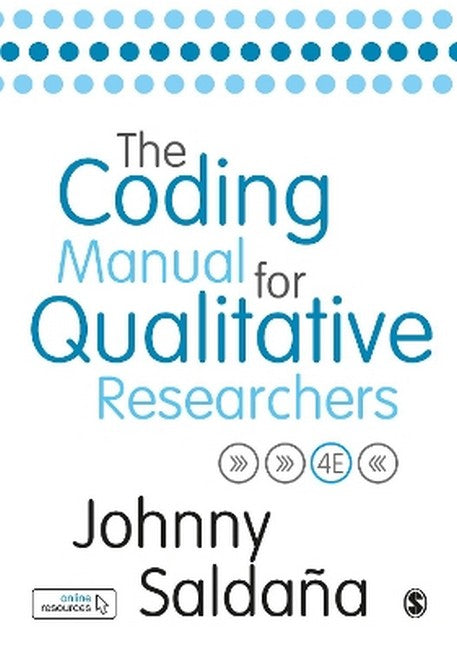Johnny Saldana is Professor Emeritus from Arizona State University's (ASU) School of Film, Dance, and Theatre in the Herberger Institute for Design and the Arts, where he taught from 1981 to 2014. He received his BFA in Drama and English Education in 1976, and MFA in Drama Education in 1979 from the University of Texas at Austin. Saldana is the author of Longitudinal Qualitative Research: Analyzing Change through Time (AltaMira Press, 2003); Fundamentals of Qualitative Research (Oxford University Press, 2011); Ethnotheatre: Research from Page to Stage (Left Coast Press, 2011); Thinking Qualitatively: Methods of Mind (Sage Publications, 2015); a commissioned title for Routledge's World Library of Educationalists Series, Writing Qualitatively: The Selected Works of Johnny Saldana (Routledge, 2018); co-author with the late Matthew B. Miles and A. Michael Huberman for Qualitative Data Analysis: A Methods Sourcebook (4th ed., Sage Publications, 2020); co-author with Matt Omasta for Qualitative Research: Analyzing Life (Sage Publications, 2018); and the editor of Ethnodrama: An Anthology of Reality Theatre (AltaMira Press, 2005). Previous editions of The Coding Manual for Qualitative Researchers have been translated into Korean, Turkish, and Chinese-Simplified. Saldana's methods works have been cited and referenced in more than 16,000 research studies conducted in over 130 countries in disciplines such as K-12 and higher education, medicine and health care, technology and social media, business and economics, government and social services, the fine arts, the social sciences, human development, and communication. He has published a wide range of research articles in journals such as Research in Drama Education, The Qualitative Report, Multicultural Perspectives, Youth Theatre Journal, Journal of Curriculum and Pedagogy, Teaching Theatre, Research Studies in Music Education, Cultural Studies ? Critical Methodologies, the International Journal of Qualitative Methods, the International Review of Qualitative Research, and Qualitative Inquiry, and has contributed several chapters to research methods handbooks. His most popular journal article, "Blue-Collar Qualitative Research: A Rant" (Qualitative Inquiry, 2014), has been downloaded by over 3,000 readers, according to ResearchGate. Saldana's research in qualitative inquiry, data analysis, and performance ethnography has received awards from the American Alliance for Theatre & Education, the National Communication Association-Ethnography Division, the American Educational Research Association's Qualitative Research Special Interest Group, New York University's Program in Educational Theatre, the Children's Theatre Foundation of America, and the ASU Herberger Institute for Design and the Arts.
Request Academic Copy
Please copy the ISBN for submitting review copy form
Description
Part I: Coding Foundations Chapter 1: An Introduction to Codes and Coding Chapter 2: Fundamental Coding Methods and Techniques Chapter 3: Writing Analytic Memos about Narrative and Visual Data Part II: First Cycle Coding Methods Chapter 4: Selecting First Cycle Coding Methods Chapter 5: Grammatical Coding Methods Chapter 6: Elemental Coding Methods Chapter 7: Affective Coding Methods Chapter 8: Literary and Language Coding Methods Chapter 9: Exploratory Coding Methods Chapter 10: Procedural Coding Methods Chapter 11: Methods of Themeing the Data Part III: Second Cycle Coding Methods Chapter 12: Transitioning from First to Second Cycle Coding Methods Chapter 13: Second Cycle Grounded Theory Coding Methods Chapter 14: Second Cycle Cumulative Coding Methods Chapter 15: After First and Second Cycle Coding Methods
This coding manual is the best go-to text for qualitative data analysis, both for a manual approach and for computer-assisted analysis. It offers a range of coding strategies applicable to any research projects, written in accessible language, making this text highly practical as well as theoretically comprehensive. -- Brigitte Smit With this expanded fourth edition of The Coding Manual for Qualitative Researchers, Saldana has proved to be an exemplary archivist of the field of qualitative methods, whilst never losing sight of the practical issues involved in inducting new researchers to the variety of coding methods available to them. His text provides great worked examples which build up understanding, skills and confidence around coding for the new researcher, whilst also enhancing established researchers' grasp of the key principles of coding. -- Margaret Hogg Johnny Saldana's Coding Manual for Qualitative Researchers has been an indispensable resource for students, teachers and practitioners since it was first published in 2009. With its expanded contents, new coding methods and more intuitive structure, the fourth edition deserves a prominent place on every qualitative researcher's bookshelf. -- Steven A. Harvey An essential text for qualitative research training and fieldwork. Along with updated examples and applications, Saldana's fourth edition introduces multiple new coding methods, solidifying this as the most comprehensive, practical qualitative coding guide on the market today. -- Kait Atkins This book really is the coding manual for qualitative researchers, both aspiring and seasoned. The text is well-organized and thorough. With several new methods included in the fourth edition, this is an essential reference text for qualitative analysts. -- Erin Cooney

